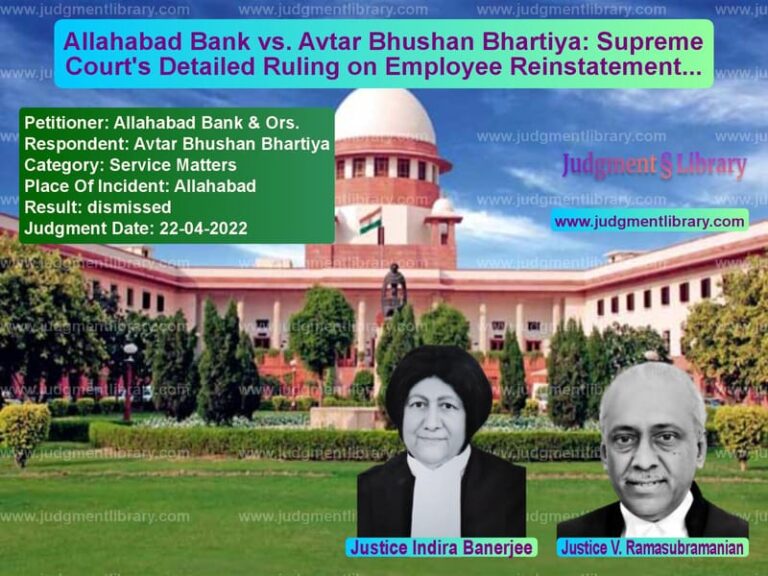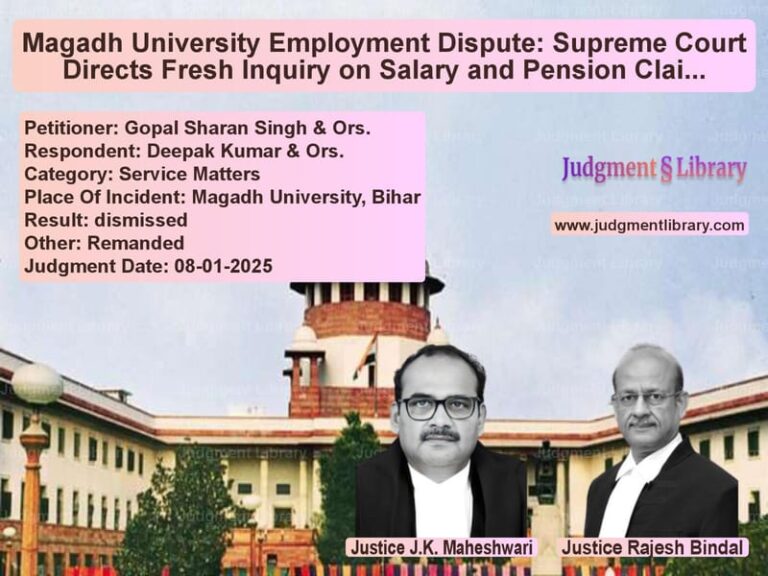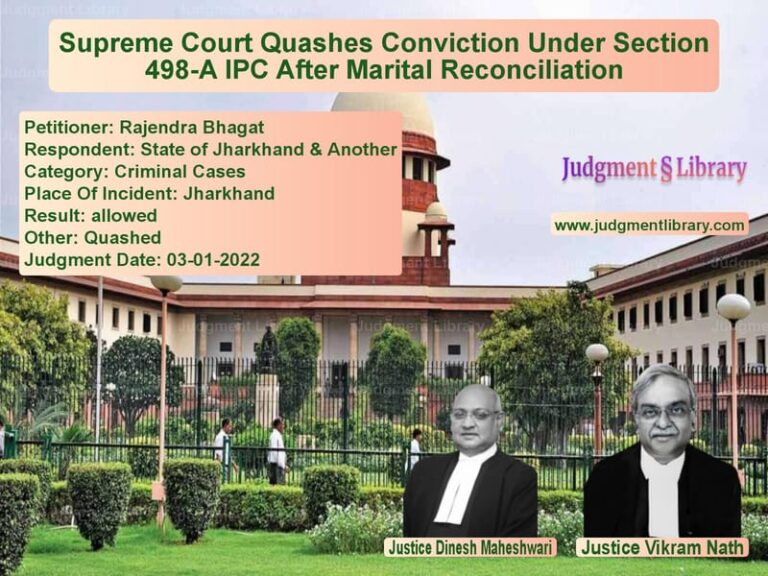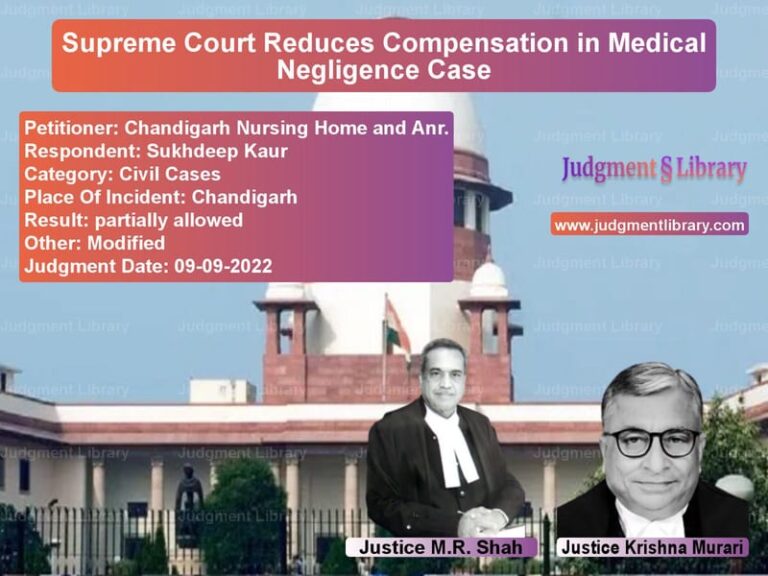Judicial Appointments in Kerala: Supreme Court Strikes Down High Court’s Interpretation of Selection Rules
The Supreme Court of India in High Court of Kerala vs. Reshma A. & Others addressed an important issue concerning judicial appointments, particularly regarding whether vacancies arising within a year of the approval of a merit list should be filled from that list or be reserved for future recruitment. The Court ruled that appointments must adhere strictly to notified vacancies, setting aside the Kerala High Court’s decision that had allowed filling additional vacancies beyond those advertised.
Background of the Case
The dispute arose when the High Court of Kerala issued a notification on February 1, 2019, inviting applications for appointment to the post of Munsiff-Magistrate in the Kerala Judicial Service. The notification listed 37 ‘probable’ vacancies, including one reserved for persons with disabilities, to be filled through direct recruitment and recruitment by transfer.
After conducting the selection process, a final merit list was published on February 20, 2020, and subsequently approved by the Governor on May 7, 2020. Based on this, 32 candidates were appointed against regular vacancies, and 5 candidates against No Candidate Available (NCA) vacancies.
The respondents, who were not selected, filed petitions under Article 226 of the Constitution, claiming that more vacancies had arisen by May 7, 2020, and that Rule 7(2) of the Kerala Judicial Service Rules, 1991 (as amended in 2019) required all vacancies arising within one year of the Governor’s approval to be filled from the existing merit list.
Key Legal Issues Addressed
1. Whether Rule 7(2) of the Kerala Judicial Service Rules Contradicts Supreme Court Guidelines
The Kerala High Court had interpreted Rule 7(2) to mean that all vacancies arising within one year of the approval of the merit list must be filled from that list. The Supreme Court examined whether this interpretation conflicted with its earlier decision in Malik Mazhar Sultan (3) vs. Uttar Pradesh Public Service Commission, which laid down a strict timeline for judicial appointments.
2. Whether Candidates Can Claim Appointment Against Future Vacancies
The respondents argued that since additional vacancies had arisen before the expiry of the merit list, they should be considered for appointment. The Kerala High Court accepted this view, but the Supreme Court had to determine whether such an approach was consistent with Articles 14 and 16 of the Constitution.
3. Impact of ‘Probable’ Vacancies in Recruitment Notifications
The notification had used the term ‘probable’ vacancies. The Supreme Court had to clarify whether this allowed flexibility in filling vacancies beyond those initially advertised.
Findings of the Court
1. Vacancies Must Be Determined at the Start of the Recruitment Year
The Supreme Court ruled that judicial appointments must adhere to a fixed recruitment schedule, as established in Malik Mazhar Sultan (3). The Court stated:
“Future vacancies conceptually fall in a distinct category. Future vacancies that arise in a subsequent recruitment year cannot be treated as anticipated vacancies of a previous selection year.”
The Court clarified that anticipated vacancies refer to those that can be reasonably foreseen, such as retirements and promotions, but do not include vacancies arising unexpectedly in a subsequent year.
2. Rule 7(2) Must Be Interpreted in Line with Constitutional Principles
The Supreme Court emphasized that Rule 7(2) must be harmonized with Articles 14 and 16, which guarantee equal opportunity in public employment. The Court held:
“Appointments beyond the notified vacancies deny and deprive the constitutional right under Article 14 read with Article 16(1) of those persons who acquire eligibility for the post in question in accordance with the statutory rules subsequent to the date of notification of vacancies.”
3. High Court’s Interpretation Would Lead to Administrative Uncertainty
The Supreme Court criticized the Kerala High Court’s approach, which required ongoing recruitment adjustments based on vacancies arising post-notification. The Court stated:
“If the directions of the High Court are followed, this would cause serious prejudice to candidates who qualify in terms of eligibility during the recruitment process of 2020 by reducing the number of probable vacancies and adding them to the previous recruitment cycle.”
Read also: https://judgmentlibrary.com/supreme-court-rules-on-career-advancement-scheme-in-universities/
The Court noted that such an approach would create administrative confusion and undermine the structured recruitment process.
Supreme Court’s Verdict
The Supreme Court set aside the Kerala High Court’s ruling and held that:
- Appointments must be strictly limited to the vacancies notified at the start of the recruitment process.
- Future vacancies arising in a new recruitment year cannot be allocated to the previous year’s select list.
- Rule 7(2) must be interpreted in a manner consistent with constitutional principles and previous Supreme Court guidelines.
- All judicial recruitments must be conducted annually, as per the timeline established in Malik Mazhar Sultan (3).
Conclusion
This ruling reinforces the structured process for judicial appointments, ensuring that:
- Recruitment remains transparent and predictable.
- Appointments do not extend beyond notified vacancies.
- Each recruitment year remains independent, preventing overlaps that could disadvantage future candidates.
The Supreme Court’s decision ensures adherence to constitutional principles and prevents arbitrary expansion of selection lists beyond advertised vacancies.
Petitioner Name: High Court of Kerala.Respondent Name: Reshma A. & Others.Judgment By: Justice Dhananjaya Y Chandrachud, Justice Indira Banerjee.Place Of Incident: Kerala.Judgment Date: 11-01-2021.
Don’t miss out on the full details! Download the complete judgment in PDF format below and gain valuable insights instantly!
Download Judgment: high-court-of-kerala-vs-reshma-a.-&-others-supreme-court-of-india-judgment-dated-11-01-2021.pdf
Directly Download Judgment: Directly download this Judgment
See all petitions in Recruitment Policies
See all petitions in Public Sector Employees
See all petitions in Judgment by Dhananjaya Y Chandrachud
See all petitions in Judgment by Indira Banerjee
See all petitions in allowed
See all petitions in supreme court of India judgments January 2021
See all petitions in 2021 judgments
See all posts in Service Matters Category
See all allowed petitions in Service Matters Category
See all Dismissed petitions in Service Matters Category
See all partially allowed petitions in Service Matters Category







